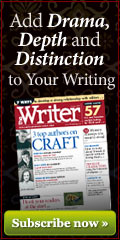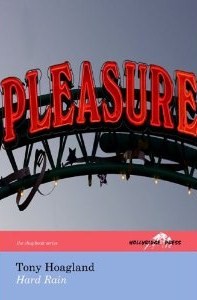Issue 4 - Winter 2011 Reviews Arranging the Blaze Beasts and Violins Crazy Jane Eating Fruit Out of Season Five Kingdoms Hard Rain Heathen Little Oceans Multiverse Open Slowly Psyche's Weathers Silent Music Something Must Happen The Apocalypse Tapestries The Darkened Temple The Kingdom of Possibilities The Tyranny of Milk This Pagan Heaven Woman on a Shaky Bridge You Know Who You Are Interviews
 |
Hard Rain by Tony Hoagland is like having a conversation over a bottle of wine after everyone has left the restaurant with a poet that tells his reader straight out what he sees around him. This collection seems to pull the ironic, the emblematic and the absurdity out of everyday events. “Responsibility in Metaphor” is a whirling, cadenced gathering of metaphors that skip off the page:
In Dialectical Materialism, Hoagland juxtaposes a supermarket trip with the convergence of the world around us and the reader realizes that there is more to us than the small chores to which we relegate all of our concentrated attention:
Hoagland’s use of space and long lines pulls the reader into the cadence so that we can see the world through his expanding eye. He reaches to bring the outside world into our small spaces and forces us to acknowledge that there is a big looming world out there that hinges on our everyday lives, whether we want to see it or not. In “Romantic Moment” the colors and sights that extend from the opening line of “After seeing a nature documentary” so the reader and then, once, Hoagland pushes the contrasts between animal, nature and human boundaries:
We move from the seemingly soft afternoon into the rituals of mating across a vast set of animal comparisons until finally the humanness returns to the day:
The reader sees the restrained awkwardness between the couple on a date in contrast to the natural world and ends the poem wishing there were a more instinctual way for humans to interact. In “Breaking Up Is Hard To Do” Hoagland approaches the subject of breakups, not in a sentimental way, but in an everyday casualness that reflects how we move on quickly in our everyday lives:
But the casualness with which he handles these occurrences shifts at the end of the poem when the emotion behind the action is revealed:
But for me, “Hard Rain” is the poem that illustrates the disintegration of meaning. That the context is lost the further we get from the actual experience:
Reviewed by Joan Hanna. |
